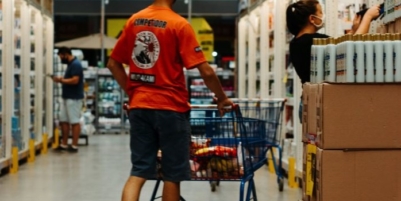-
ROSSLARE EUROPORT TARGETS HEALTH & SAFETY WITH CAMERA TELEMATICS PARTNERSHIP - 2 days ago
-
Landmark Study Reveals Wearable Robotics Significantly Boost Safety and Efficiency in Industrial Environments - July 24, 2024
-
Visku Tackle The Retail Seasonality Challenge One Pallet At A Time - July 22, 2024
-
KAMMAC AND BERGEN LOGISTICS STRENGTHEN FASHION & LIFESTYLE SERVICES IN THE UK - July 19, 2024
-
TENTBOX EXTENDS PARTNERSHIP WITH ARROWXL TO SUPPORT INCREASING DEMAND - July 17, 2024
-
The Perfume Shop improves customer journeys while driving profitability in partnership with Scurri - July 17, 2024
-
ZEROMISSION SECURES £2.3M ($3M) INVESTMENT TO ACCELERATE ELECTRIC FLEETS - July 16, 2024
-
BCMPA CELEBRATES SUCCESS OF 2024 CONFERENCE - July 15, 2024
-
Best of the Best: Jungheinrich Celebrates Triple International Award Win - July 12, 2024
-
GOPLASTICPALLETS.COM CALLS ON NEW CHANCELLOR RACHEL REEVES TO CONSIDER PLASTIC PACKAGING TAX REFORM - July 10, 2024
SOTI reveals consumers will look at shipping and delivery tracking, multiple return touchpoints and sustainable shopping options before making a final purchase
The UK retail sector is officially taking on the hybrid business model. The way consumers shop has radically changed once again due to a global supply chain crisis that limited product selection. Inflation and currency issues have also impacted the price of goods at a global scale. Adding to these pressures, consumer expectations have increased. Consumers are now looking for retailers to accommodate their personalised shopping preferences, both online and in-store.
According to SOTI’s new global research report The Tech Effect: Strengthening the Omnichannel to Meet Consumer Demands, retailers that do not leverage technology to enhance online and in-store shopping experiences risk losing consumers to competitors quicker than in previous years as the sector evolves.
2022 Created Consumer Shopping Challenges
The 2023 retail report outlines that economic and supply chain issues made it difficult for consumers to shop, as 92% of UK consumers (88% globally) experienced availability, pricing and shipping issues. This is an 8% increase from the previous year’s report for both UK and global shoppers, prompting consumers to keep an eye out for solutions to these factors before making a purchase online or in-store.
| Items are more expensive | 59% |
| Items are no longer available after being ordered and paid for | 55% |
| Delivery times are slower than usual | 33% |
| Delivery charges are more expensive | 34% |
The Best of Both Worlds
With consumers identifying numerous challenges, it is the retailers that offered the most seamless shopping experience, online and in-store, that thrived. The report found 51% of UK consumers (46% globally) still prefer to shop online. While emphasising the strength of e-commerce, the research confirms a consistent leaning towards a hybrid shopping model. This provides retailers an opportunity to merge strategies from both worlds and fix consumer pain points. 37% of UK consumers state their preference is to buy items online and pick them up in-store – a 13% increase compared to last year.
In this hybrid shopping model, consumers are looking for retailers to offer enhanced and more personalised experiences. In fact, 46% of respondents in the UK (50% globally) prefer to shop with retailers who offer an experience based on their individual preferences.
“It is clear that UK consumers have experienced more issues in 2022, leading to an increased demand for flexible hybrid shopping options,” said Stefan Spendrup, VP of Sales, Northern and Western Europe at SOTI.” “This is especially true when it comes to taking control of deliveries and opting to pick up items themselves. Retailers must respond by providing a seamless and personalised shopping experience, but this can only be achieved by adopting the latest technologies at every touchpoint throughout the buying journey. This includes a digitised backend infrastructure integrated with mobile tracking technology to provide real-time information, faster shopping and checkout processes, and multiple delivery and return options.”
Transaction Deal Breakers
Both the purchasing process and fulfilment are important to consumers. Two-thirds (66%) of UK and global consumers expect to know where their order is within the delivery process at all times. Additionally, demand for faster deliveries has increased too, as 62% of UK consumers (61% globally) agree they shop with the brands that can deliver goods the fastest – a 2% increase from last year.
When it comes to ordering items, the top three options for UK consumers are front door home delivery at 56% (52% globally), in-home delivery via smart lock at 14% (13% globally) and in-store collection at 13% (14% globally). In addition, 72% of UK consumers (70% globally) said delivery time and speed are still most important to them, up 7% from last year. Returns are important too, with 59% of UK consumers (55% globally) agreeing they are more likely to shop from an online retailer that provides multiple options to return a product.
“With delivery charges becoming prominent and consumers wanting more options to complete their purchases, retailers must choose delivery partners carefully to successfully fulfil consumer expectations and demands to gain brand loyalty,” added Spendrup. “One way retailers can ensure they are providing accurate information to consumers is to update both the hardware and software involved across the entire supply chain management process. This will allow them to better inform their consumers of product availability and delivery times.”
The Grass Can Be Greener on the Other Side
As consumers become more conscious of their spending and the brands they shop from, carbon impact is becoming a new deciding factor. The report echoes this sentiment, revealing that 48% of UK consumers (54% globally) prefer a more sustainable way to return goods. Additionally, 44% of UK and global consumers agree that they would prefer to shop with a retailer who offers carbon offset and more recyclable packaging.
“People are becoming conscious of their impact on the environment, and it is now a deciding factor in how they shop and where they buy. Retailers who can react to this by resolving challenges and providing flexible business models will strengthen consumer loyalty at a time when markets are extremely volatile,” concluded Spendrup.
SOTI’s 2023 Retail Report, The Tech Effect: Strengthening the Omnichannel to Meet Consumer Demands, can be downloaded here.
Report Methodology
Commissioned by SOTI, Arlington Research, an independent market research agency, conducted 10,000 interviews using an online methodology, with adults aged 18 to 65 years old with nationally representative quotas on gender, age and region set at country-levels between October 26 and November 3, 2022. The 10,000 interviews were split across eight markets as follows: U.S., Canada, Mexico, UK, Germany, France, Sweden and Australia.
About SOTI
SOTI is the world’s most trusted provider of mobile and IoT management solutions, with more than 17,000 enterprise customers and millions of devices managed worldwide. SOTI’s innovative portfolio of solutions and services provide the tools organizations need to truly mobilize their operations and optimize their mobility investments. SOTI extends secure mobility management to provide an integrated solution to manage and secure all mobile devices and connected peripherals in an organization. For more information, visit soti.net.

































